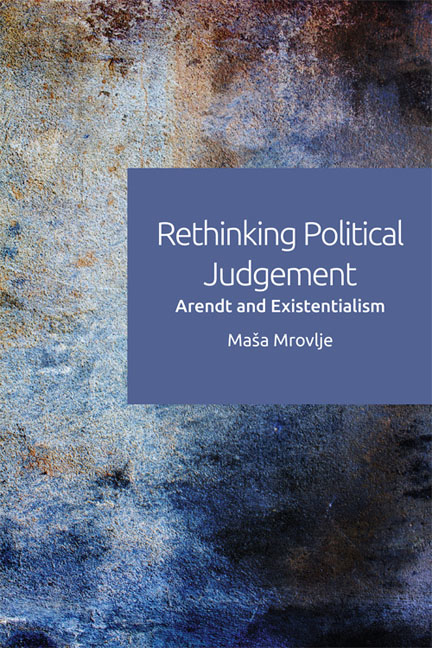Book contents
- Frontmatter
- Contents
- Acknowledgements
- Introduction
- 1 Political Judgement in the History of Political Thought and the Modern Crisis
- 2 Sartre and Beauvoir: The Ambiguity of Political Judgement and the Challenge of Freedom and Responsibility
- 3 Camus and Arendt: Confronting the Ambiguity of Political Judgement and Illuminating the Limits of the World
- 4 Political Judgement and Narrativity
- 5 Facing Up to the Tragedy of Political Action: The Problem of Dirty Hands
- 6 Times of Transition: Reconciling with the Tragic Nature of Political Affairs
- Conclusion: Reclaiming Wonder at the World of Political Affairs
- Bibliography
- Index
3 - Camus and Arendt: Confronting the Ambiguity of Political Judgement and Illuminating the Limits of the World
- Frontmatter
- Contents
- Acknowledgements
- Introduction
- 1 Political Judgement in the History of Political Thought and the Modern Crisis
- 2 Sartre and Beauvoir: The Ambiguity of Political Judgement and the Challenge of Freedom and Responsibility
- 3 Camus and Arendt: Confronting the Ambiguity of Political Judgement and Illuminating the Limits of the World
- 4 Political Judgement and Narrativity
- 5 Facing Up to the Tragedy of Political Action: The Problem of Dirty Hands
- 6 Times of Transition: Reconciling with the Tragic Nature of Political Affairs
- Conclusion: Reclaiming Wonder at the World of Political Affairs
- Bibliography
- Index
Summary
Responding to the recognised tragedies of the world of political affairs, this chapter turns to Camus's and Arendt's existential orientation which nevertheless resists the conventional world-view of ‘existentialism’. In their efforts to understand the breakdown of traditional standards of thought, it unveils a deeper recognition of the dangers of nihilism and excess that accompany the situated ambiguity of political judgement. In turn, it discerns in their aesthetic sensibility a heightened sense of the need to creatively confront the plurality and complexity of the world, rather than resign to the logic of inevitability and failure. The chapter first engages Camus's ‘artistic’ sensibility, beginning with a brief biographical overview of his ethical and political commitments. Based on his insights into the depth of the modern crisis of judgement, it continues by illuminating the political significance of his aesthetic attentiveness to the limits of the world and of others. Camus's artistic judgement, it is argued, faces up to the conflicts and injustices by refusing the ‘necessary’ choice between ‘victims and executioners’, and striving to reveal the common ground for dialogue between a plurality of human freedoms. The chapter next brings into view Arendt's distinctly political existential orientation. Critically surveying the existing interpretations of her ‘existentialism’, it re-examines Arendt's account of political judgement in light of her phenomenological–existential commitment to coming to terms with ever-changing worldly reality. It reveals how her reworking of Kant's account of aesthetic judgement further illuminates the humanising import of Camus's dialogic sensibility, foregrounding judgement as a specifically political ability of representative thinking, offering support to a vibrant public sphere.
Albert Camus
The thought of Albert Camus is characterised by a thoroughgoing rebellion against traditional philosophy's taste for abstract reasoning and system-building. In this rebellion, Camus rejected the label of philosopher altogether, and counter-posed to the ways of thinking, prevalent in the Western tradition of political thought, the sensibility of an artist (see Camus 1995g: 239; Camus in Todd 1997: 408). It was his profound ‘distrust of ideas’ that led Camus to distance himself not only from traditional philosophy but from existentialism as well. This intellectual current, at least in Sartre's version, for him represented ‘a complete philosophy, a vision of the world, which presupposes a metaphysics and an ethics’ (Camus in Aronson 2004: 283).
- Type
- Chapter
- Information
- Rethinking Political JudgementArendt and Existentialism, pp. 81 - 114Publisher: Edinburgh University PressPrint publication year: 2017

